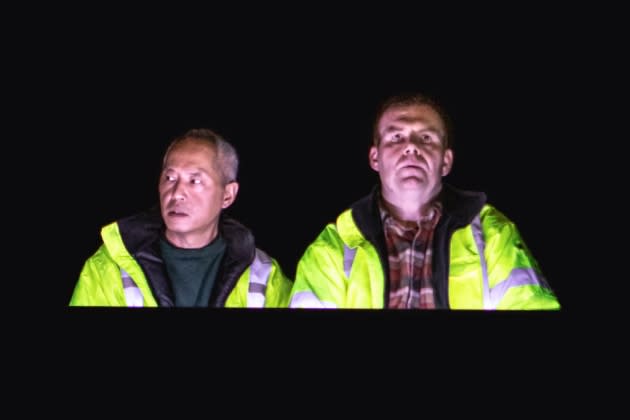‘Evanston Salt Costs Climbing’ Review: There is Nothing Thrilling About Climate Change Except This Play

The use of the word “fuck” as a statement occurs approximately 62 times in Will Arbery’s new play, “Evanston Salt Costs Climbing,” and “Haha” or “Hahahaha” appears approximately 34 times, sometimes together with the word “fuck.” It’s perfect — dreadful and hilarious — considering this brilliant, 95-minute, one-act tragicomedy takes place over three recent Illinois winters, all rushing toward the climate apocalypse.
But forget the words “climate apocalypse,” because no one in the play (or on the planet) wants to think about them: Three of the four characters in Arbery’s play work at a company that salts roads when storms are coming, and they mostly don’t speak about the terrifying weather that plays a central role in their lives — they just zip up their parkas when they’re freezing and unzip them a few minutes later when they’re suddenly strangely hot and say “fuck” a lot and then laugh. Sometimes they cry.
More from Variety
Peter (Jeb Kreager) and Basil (Ken Leung) — two ordinary, forty-something guys who’ve been working together for years — drive the salt truck. Maiworm (Quincy Tyler Bernstine), the middle-aged assistant director of public works, comes by often to say hi to the men she secretly knows will lose their jobs in the near future to the soaring prices of salt and the necessity to implement climate-defying technology on roads that are collapsing (shhh!) under the current situation. Maiworm remains mostly cheerful, though her grown daughter, Jane Jr. (Rachel Sachnoff), who lives at home, is either having a hysteria-ridden nervous breakdown or the sanest of reactions to the impending end of the world.
All four of these people try to help each other, though mostly everyone’s either in denial or lying about what they know or trying to put a good face on it or working hard to make others feel better because, despite the fact that they’re all hearty, lovely Midwesterners, they’re sad, terrified and angry (the words “fuck you” are uttered 34 times). More than one, in fact, is contemplating suicide.
Under Danya Taymor’s direction, the acting by all four performers is pitch perfect — funny, subtle, and deeply moving — although having spare, punchy dialogue a la Samuel Beckett and David Mamet in a Sam Shepherd-esque, classic American setting doesn’t hurt. (The staging, set design, lighting and sound are all equally A-plus.) What Arbery (“Succession”) adds to all that gorgeous craftsmanship is unusual insight into the way human beings work together to deny reality and still love one another — or maybe “work together” is not the right phrase, because mostly what Arbery’s characters are doing is fending each other off. They all love to read and write little stories about their lives, but when Maiworm asks them to dive into a nonfiction book she adores because it’s so true to reality — Jane Jacobs’ “The Death and Life of Great American Cities”— it literally goes out the window and into the snow.
In the show’s visceral set design, a giant warehouse façade takes up the entire stage, with two huge doors that roll up and down to reveal two levels on which to put the cab of a truck, Maiworm’s bedroom, the space where Basil and Peter drink coffee before work, various common rooms, and a road where salt does not keep a woman from dying. The stage is often lit by a single light shining through a tiny window, and the angles it makes on the floor create a sense of either freezing cold or boiling hot. The sound effects — truck engines, screeching tires, salt falling, and the occasional crash — feel like characters unto themselves, and when Taymor puts them all together to create a sense of deep-gut, world-ending terror, it’s breathtaking. (This is one of those pieces of art where the depiction of horror is both uplifting and inspiring.)
Don’t listen if someone tells you that “Evanston Salt Costs Climbing” is about climate change, because you won’t go. (Who would?) But this tiny play about love and loss and betrayal in a dying Middle America is something everyone should see and then talk about.
Best of Variety
Sign up for Variety’s Newsletter. For the latest news, follow us on Facebook, Twitter, and Instagram.

